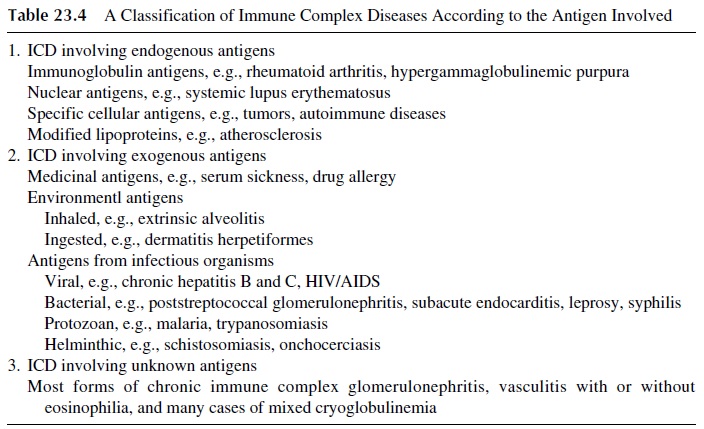Chapter: Medical Immunology: Immune Complex Diseases
The Role of Immune Complexes in Human Disease
THE ROLE OF IMMUNE COMPLEXES IN HUMAN DISEASE
A. Classification of Immune Complex Diseases
Immune complexes have been implicated in human disease either through demonstration in serum or through identification in tissues where lesions are found.

Most often the anti-body moiety of the immune complex is detected, and knowledge about the antigens in-volved is still very fragmentary. However, one of the most common classifications of IC disease, proposed by a WHO-sponsored committee, is based on the nature of the antigens involved (Table 23.4).
B. Clinical Expression of IC Disease
The clinical expression of IC disease depends on the target organs where the deposition of IC predominates:
· The kidney is very frequently affected (systemic lupus erythematosus, mixed cryo-globulinemia, chronic infections, poststreptococcal glomerulonephritis, pur-pura hypergammaglobulinemica, serum sickness, etc.), usually with glomeru-lonephritis as the predominating feature.
· The joints are predominantly affected in rheumatoid arthritis.
· The skin is affected in cases of serum sickness, mixed cryoglobulinemia, and vas-culitis.
· The large vessels are affected by the subendothelial formation of antigen-antibody complexes containing oxidized low-density lipoprotein and the corresponding antibodies, leading to the development or progression of atherosclerosis.
· The lungs are affected in extrinsic alveolitis.
The reasons why the target organs can vary from disease to disease are not clear. In some cases, such as in extrinsic alveolitis, the route of exposure to the antigen is a major determinant for the involvement of the lungs. The kidneys, due to their physiological role and to the existence of C3 and Fc receptors in different anatomical structures, appear to be an ideal organ for IC trapping. In rheumatoid arthritis, IC appear to be present not only in the circulation, but also to be present (and probably formed) in and around the joints, and although they do not appear to be the initiating factor for the disease, their potential for per-petuating the inflammatory lesions is unquestionable. Finally, the reasons why some IC are trapped in the skin, leading to vasculitis and other dermatological manifestations, are un-known.
Related Topics